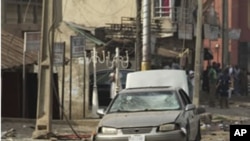Nigeria’s information minister, Labaran Maku, said his country’s security forces have made enormous progress in combating the threat posed by the Islamist Boko Haram sect, particularly in the federal capital, Abuja.
The minister’s comments followed a warning Wednesday by the U.S. Embassy in Nigeria that Boko Haram may be planning attacks against hotels and other areas in Abuja, frequently used by Westerners.
Maku said, while Nigeria respects the opinion of the United States, it also believes that making such public pronouncements about terror threats has a tendency to cause panic in the population.
“You remember about a year ago, they issued a similar warning to Americans in Nigeria, and what we told them at that time was that, yes, we know we have security challenges, but we didn’t think that the best approach is always to issue public statements that sometimes end up causing a lot of public panic,” he said.
Maku described the United States as a close ally and a friend of Nigeria. He said the Nigerian government appreciates the support it has received from Washington in its time of challenges and good times.
He also appealed for more cooperation between Nigeria and the United States in the fight against Boko Haram.
“We believe the best approach would be for the American mission in Nigeria, the American government, to collaborate with our agencies and share information,” he said.
Maku said quiet cooperation and sharing information often yields more positive results than occasional public statements, which he said hardly help the situation.
He rejected criticism by some who say the Nigerian government has not done enough to end the Boko Haram threat.
“The question of terror, as you do know, from the United States, to Afghanistan, to Algeria, to Yemen, is that because this isn’t the standing army we’re following, it is not a war in which you can set a date, but definitely the idea is to continue to struggle to minimize and to prevent until it is reduced to its barest minimum, which is what the Nigeria government had been doing,” Maku said.
He blamed what he called the “onlooker media” for giving Boko Haram prominence.
“What every terror group seeks to do is to create fear and public panic, to create disaffection, and terror has used the media so excellently since 9/11 [September 11, 2001] that today, it has grown from an operation of a few people into an international network because the media has handled it, especially [the] international media,” Maku said.
Some analysts have suggested that poverty in northern Nigeria was responsible for pushing young people there toward terrorism and Boko Haram.
Maku said Nigeria realizes it has development challenges in the north and other parts of the country. But, he said the government has put in place programs, including recently a public works program, to employ young people.
However, Maku said terrorism cannot be blamed on poverty alone.
“If you study the social background of those who carried out 9/11 [terror attacks in the United States], you will know that they are not poor people. So, yes, it’s true that poverty generates an environment for crime generally, but it alone does not explain crime. I think there are other issues that we must look at,” Maku said.
Maku said what is needed is mutual cooperation to create the kind of environment where terrorism can be defeated.




